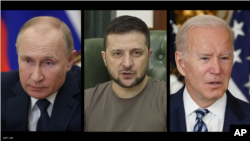Three heads of state playing big parts in the Ukraine crisis show three very different leadership styles, experts told VOA.
Samuel Hunter is a professor of industrial and organizational psychology at the University of Nebraska at Omaha. He said, “It doesn't always happen that you have one of each.”
For Hunter, Russian President Vladimir Putin, Ukrainian President Volodymyr Zelenskyy and U.S. President Joe Biden represent the three styles.
These three styles are: the ideologue, the charismatic leader and the pragmatist. Each term requires some explanation.
The ideologue
Putin is what some experts would call an ideological leader.
Dr. Kenneth Dekleva is a psychiatrist and a scholar at the George H. W. Bush Foundation for U.S.-China Relations. He has studied Vladimir Putin for 20 years.
Before becoming Russia’s president, Putin was a member of the KGB, the foreign intelligence and domestic security agency for the former Soviet Union.
“He's a ruthless, authoritarian leader who has carried out ruthless acts over the past two decades,” Dekleva said.
Putin has developed the image of a physically fit man-of-action. He has released pictures of himself riding a horse, fishing, carrying a rifle and demonstrating martial arts.
“Putin represents a much more familiar and old-fashioned style of leadership in that he presents himself as uniquely strong and uniquely touched by destiny,” says Michael Blake. He is a professor at the University of Washington.
Blake said the Putin image is of a man who can defeat others, using “cruelty,” if necessary.
The experts said that one of Putin’s goals is to return Russia to the powerful position it enjoyed as the Soviet Union, which collapsed in 1991.
“So, there's a bygone era that they either wish existed or hope to return to,” Hunter said.
The charismatic leader
Ukraine’s President Volodymyr Zelenskyy has presented himself as a charismatic leader. He is a former actor and comedian. He surprised many with his actions after Russia invaded his country on February 24.
Hunter said charismatic leaders seek to support “this sentiment of hope, that sentiment of change…” He is “appealing to the masses and a broad message,” he said.
While Putin seems to be following an old-style plan, Zelenskyy is demonstrating a new one, Blake added.
Because of Zelenskyy’s background, many underestimated him politically. He has urged his people to rise up against the Russian attack.
When the United States offered to rescue the Ukrainian leader and his family, Zelenskyy refused, reportedly saying: “The fight is here. I need ammunition, not a ride.”
“I think we assumed that Zelenskyy was a lightweight…that he would flee.” But Dekleva added, “…he made a decision that resonates with the world.”
The pragmatist
U.S. President Joe Biden has led the West’s answer to the Russian attack on Ukraine. Hunter considers him an example of a pragmatic leader.
“Pragmatic leaders are all about problem-solving. They're often very rational, data driven, by the numbers. And in many ways, pragmatic leaders are boring,” said the professor.
Blake added that Biden is less concerned with showing himself to be carrying out some destiny. Much of Biden’s attention has been on taking careful measures to protect U.S. interests while staying away from the conflict itself.
The outcome
A major crisis can show or define a politician’s leadership style.
During a crisis “you're under time pressure and stress,” Hunter said. “All these things combined to make it much more difficult to self-regulate, and who you really are will emerge.”
“We’re in a very, very delicate, dangerous situation now where Putin is cornered…he’s boxed in a corner. That's a dangerous Putin,” Dekleva said.
“I think we have to be very careful and provide, diplomatically, what's called an off-ramp…”
An “off-ramp” is a term used to describe a reduction in tension and anger. The idea, Dekleva said, is to present ways to “save face and back off from this war.”
I’m Mario Ritter, Jr.
Dora Mekouar reported this story for VOA. Mario Ritter Jr. adapted it for VOA Learning English.
__________________________________________________________________
Words in This Story
style –n. a way of behaving or of doing things
ruthless –adj. having no pity, cruel or without mercy
authoritarian –adj. expecting or requiring people to obey rules or laws : not allowing personal freedom
unique –adj. used to say that something or someone is unlike anything or anyone else
destiny –n. a power that is believed to control what happens in the future
comedian –n. a person who performs in front of a people and makes them laugh by telling jokes or funny stories or by acting in a way that is funny; an actor who plays parts that make people laugh
sentiment –n. feeling; ways of thinking or opinions about things
resonate –v. to have meaning or importance for someone
rational –adj. based on facts or reason and not on emotions or feelings
delicate –adj. easily broken or damaged
We want to hear from you. Write to us in the Comments section, and visit our Facebook page.





